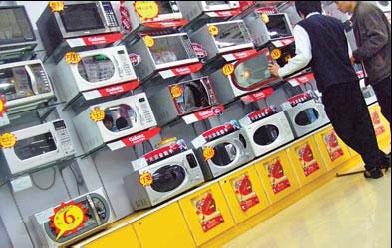
Galanz microwave ovens on display at a home appliance market in Shantou, Guangdong province.
Exporters of home appliances are likely to increase export prices to mitigate the impact of an appreciating yuan on their bottom line, analysts and industry sources said on Thursday.
Jackie Liu, export director of Galanz, the world's largest microwave-oven maker, said yuan appreciation and rising labor costs will squeeze profit margins of electric appliance makers. "We expect the full year profit to miss our earlier expectations," he said.
According to estimates from the China Chamber of Commerce for Import and Export of Machinery and Electronic Products, a 3 percent appreciation of the yuan will erode 30 to 50 percent of the profit of the home appliance makers while the profit margin is only 5 percent.
For companies like Galanz, that is a major issue as most of its business comes from exports. Nearly 60 percent of its products are exported and as such any currency fluctuation could have an impact on its profit, Liu said.
"We are shortening the order-cycle time and using financial tools like forward-swap transactions to hedge the risks from the currency fluctuation," Liu said.
At the same time the companies are also planning to increase export prices. Galanz for instance is now asking for prices based on the latest exchange rate of 6.77 yuan per US dollar.
Six months back, the company was calculating product prices at an exchange rate of 6.83 yuan per US dollar, Liu said. Adding to the woes has also been the increase in labor costs. According to Liu, labor costs have risen nearly 50 percent in a year.
Experts feel that the industry has no choice but to increase export prices to offset the shrinking profit margin.
Like Galanz, there are several manufacturers in Guangdong province who face a similar predicament. For many of them exports is the mainstay. In fact exports from the region account for one third of the exports from China.
"Yuan appreciation will be a hard blow to the nation's export-oriented manufacturing sector which has been reliant on advantages like low labor costs," said Guan Luojun, director of the Asian Manufacturing Association.
But not all are in the same boat. Domestic manufacturers who are less reliant on exports are not in that bad a situation.
Haier, a leading home appliance maker, said the currency appreciation would have little impact on its profit because only 10 percent of its business comes from overseas sales. But Haier is also expanding in markets abroad and said it may increase prices to offset the pressure of the currency appreciation.
In the long term, currency appreciation may finally translate into a price hike of products in retail stores in Europe and the US, the two largest importers of Chinese manufactured goods, said analysts.
Increased flexibility in the yuan exchange rate will help shift resources from the export sector to services and other sectors related to domestic demand. It will also transform the economic development mode and reduce the economy's excessive reliance on exports, said Ba Shusong, deputy director of the Financial Research Institute affiliated with the Development Research Center of the State Council.
A more recent signal for the country to reexamine its manufacturing industry is the export growth slowdown in March this year, according to statistics from the General Administration of Customs.
According to the Asian Manufacturing Association, moving away from an export-oriented manufacturing base is essential for China, as other Southeast Asian nations are fast catching up. "The changing scenario has also shifted the focus to high-end manufacturing characterized by technology and quality, instead of cheap labor," said Guan.





